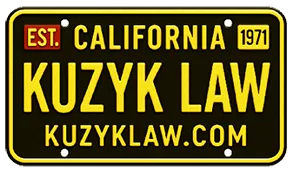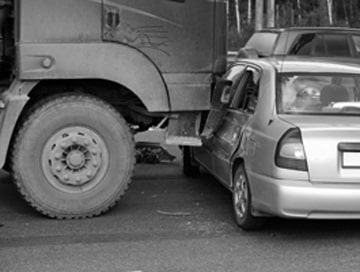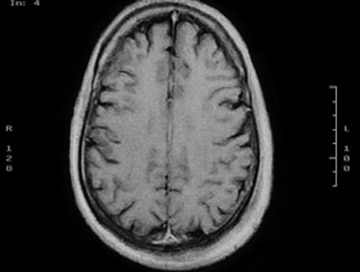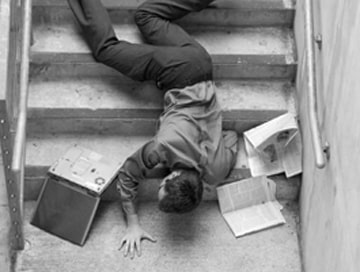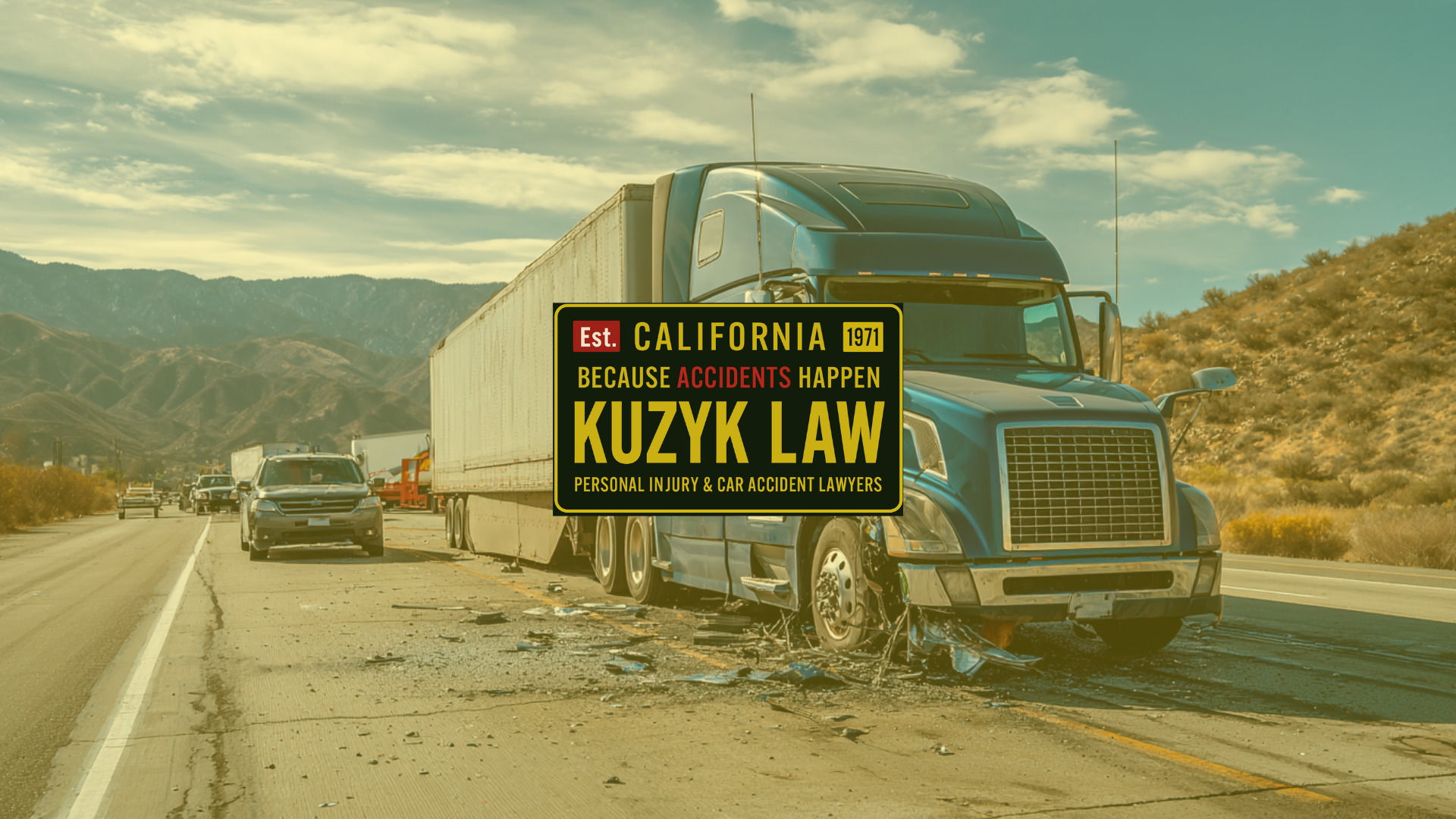
If you or someone you care about was hurt in a crash with a commercial truck, you need a Lancaster 18-wheeler truck accident lawyer who knows how serious these accidents are, how complicated the law is, and how bad they can be.
For decades, Kuzyk Law has fought for the rights of injury victims in Southern California against trucking companies, insurance companies, and careless drivers.
Accidents involving 18-wheelers are among the most deadly on the road, leaving behind serious injuries, wrecked cars, and a long road to recovery. You don’t have to deal with it on your own. Let our team work for the money you deserve.
Understanding 18-Wheeler Truck Accidents That Occur in Lancaster, CA
Lancaster is a busy place for commercial vehicles because it is at the intersection of several busy highways, such as SR-14 and SR-138. There is danger with this traffic: Lancaster has a lot of truck accidents every year, usually caused by tired drivers, speeding, poorly maintained rigs, or drivers who are new to the job.
These aren’t just minor accidents. Because 18-wheelers are so big and heavy, even low-speed crashes can cause serious injuries or death.
The Federal Motor Carrier Safety Administration says that in one year, large trucks were involved in more than 168,000 injury crashes nationwide. A lot of these happen on roads that are just like the ones that go through Lancaster.
The Scope of the Problem: 18-Wheeler Accident Statistics
Not only are truck accidents bad, but they are also happening more often. Because 18-wheelers are so big and heavy, every crash could be a disaster. Knowing this crisis’s size helps explain why quick legal action is so necessary.
| Statistic | Value | Source |
| Large trucks involved in fatal crashes (U.S., 2021) | 5,788 | NHTSA |
| Percentage of fatal crashes involving large trucks in CA | 8.9% | FMCSA |
| Estimated truck-related injury crashes in California (2022) | 12,000+ | CHP SWITRS |
| Average cost of a truck crash with injury | $200,000+ | FMCSA Economic Impact Report |
In the Antelope Valley region—including Lancaster and Palmdale—trucking traffic is consistent along SR-14, Avenue D, and other routes frequented by logistics carriers.
Recent Truck Accident News in Lancaster
January 2024 – A semi-truck collided with multiple vehicles on SR-138 near Lancaster, causing three hospitalizations and shutting down the road for hours.
October 2023 – An 18-wheeler rollover on Avenue I spilled fuel and cargo, prompting an environmental cleanup and a 12-hour road closure.
June 2023 – A tragic underride accident near the intersection of Division Street and Avenue K resulted in a wrongful death lawsuit against a regional transport company.
These headlines show a clear pattern: Lancaster is unsafe due to the risks of busy trucking routes. An experienced Lancaster 18 wheeler truck accident lawyer is very important for dealing with the aftermath of these cases, which are often complicated and involve many people.
Kuzyk Law’s Expertise in 18-Wheeler Accident Cases
At Kuzyk Law, our firm has handled personal injury cases since 1971, focusing on major auto and trucking accidents. We understand the trucking industry, federal regulations, and the tactics insurers use to avoid payouts.
Whether your case involves a motorcycle, a spinal cord injury, or wrongful death, we have the litigation firepower and resources to fight—and win. See our proven results on our verdicts & settlements page.
Experienced Lancaster 18 Wheeler Accident Lawyer Who Puts You On Even Footing With Large Insurance & Trucking Companies
After an accident with an 18-wheeler truck, you have to deal with big trucking companies and their insurance companies, who will do everything they can to limit their liability.
Because of this imbalance, it is very important to have a dedicated Lancaster 18 wheeler truck accident lawyer who knows the area well.
We know how aggressive they are at Kuzyk Personal Injury & Car Accident Lawyers. We quickly make things fair by:
Acting Fast:
We immediately work to preserve critical evidence like black box data, driver logs, and maintenance records before they are altered or disappear.
Expert Investigation:
Our team quickly interviews witnesses while memories are fresh and utilizes industry experts to meticulously reconstruct the accident scene, uncovering vital truths.
When you hire us as your truck accident lawyer or semi truck accident lawyer, you’re hiring a firm that doesn’t just build cases; we build strong cases that can’t be broken.
If you’re looking for a “truck accident lawyer near me” in Lancaster, know that our proactive approach gives you a strong advantage over even the biggest companies, greatly increasing your chances of getting the justice and money you deserve.
Why do I need an 18 Wheeler Truck Accident Attorney So Soon After The Wreck?
Time is not on your side after a semi-truck crash. Evidence disappears. Trucking companies deflect blame. Injuries worsen without medical coordination.
A Lancaster truck accident lawyer from Kuzyk Personal Injury & Car Accident Lawyers begins working immediately to protect your rights and secure your future.
Hiring legal representation early means:
- You avoid early lowball settlements
- Medical records are properly documented
- Expert witnesses can evaluate your injuries and damages
- Claims are filed within California’s statute of limitations
Common Injuries in 18-Wheeler Accidents
Head and Brain Injuries
From concussions to traumatic brain injuries (TBI), these are often invisible but debilitating.
Spinal Cord Injuries
Crashes can result in partial or total paralysis. Visit our spinal cord injury lawyer page for more information.
Fractures and Orthopedic Injuries
Compound fractures, broken ribs, and shattered limbs may require multiple surgeries.
Internal Injuries
Organ damage or internal bleeding may not be immediately obvious—but can be fatal without treatment.
Soft Tissue Injuries
Whiplash, nerve damage, and muscle tears can severely limit your mobility and daily function. Explore our whiplash lawyer page to learn more.
California Legal Process in 18-Wheeler Truck Accident Cases
It can be hard to file a claim for an 18-wheeler truck accident in California because of the state’s and federal government’s different rules. Our team of Lancaster 18-wheeler truck accident lawyers handles every step of the process so you can focus on getting better.
Initial Consultation
We offer a free, private consultation to go over your case, explain your rights, and lay out the next steps you need to take right away. This way, you will know where you stand legally from the start.
Investigation and Evidence Gathering
This important step requires a quick and thorough gathering of important evidence that is only relevant to truck accidents.
We get driver logs, truck maintenance records, surveillance footage, important black box data, GPS data, and full medical evaluations. We want to make an unbreakable case by looking at every possible angle.
Negotiation and Litigation
Most of the time, our truck accident lawyers want to settle the case fairly, but they are ready to go to court if they have to. We fight hard for you with insurance companies, using the strong evidence we have.
Our proven record in court shows that we are ready to fight hard for the full amount of money you deserve.
Emotional and Financial Toll of Truck Accident Injuries
Beyond physical trauma, victims of 18-wheeler accidents often experience an overwhelming emotional and financial burden. These cases are about more than just broken bones—they affect every aspect of your life.
Long-Term Physical Impacts
Chronic pain:
Many victims suffer for years after a crash, especially with spinal, nerve, or soft tissue injuries.
Disability or loss of function:
Amputations, paralysis, or impaired mobility can permanently alter one’s career, relationships, and independence.
Cognitive effects:
TBIs often result in memory loss, mood changes, and diminished quality of life.
Emotional Consequences
PTSD, anxiety, and depression are common among survivors of severe truck accidents—particularly if the collision involved a fatality or visible trauma.
Family members may also suffer what’s known as loss of consortium, where emotional and physical bonds are impacted due to injury.
Financial Strain
Truck accident victims face enormous costs:
- Medical bills (emergency, rehab, long-term care)
- Lost wages or inability to return to work
- Home modifications or assistive technology
- Psychological counseling
In cases of permanent disability or wrongful death, the total damages can be six or seven figures. Insurance companies know this, and they do everything they can to pay out less. You need a Lancaster 18-wheeler accident lawyer who knows how to figure out both economic and non-economic losses.
Common Types of 18-Wheeler Accidents
Rollovers
When a truck’s load is unbalanced or speed is excessive, rollovers can crush nearby vehicles.
Rear End Accidents
Big rigs need more braking time. Tailgating or distracted driving causes major impacts.
Tire Blow Outs
Improper maintenance leads to loss of control and lane departure crashes.
Underride Accidents
One of the deadliest types—smaller vehicles can slide under the trailer, leading to severe injuries or fatalities.
Each of these accident types demands unique evidence and expert testimony. Our truck accident lawyers are experienced in handling even the most complex cases.
How Trucking Companies Complicate 18-Wheeler Accident Claims
After an 18-wheeler crash, the trucking company is rarely on your side. In fact, most have legal teams and insurance adjusters mobilized within hours to protect their financial interests.
Common Defense Tactics
Delaying evidence disclosure:
They may hold back black box data, driver logs, or vehicle maintenance records.
Minimizing your injuries:
Insurers often claim your injuries are pre-existing or exaggerated.
Shifting the blame:
Companies might try to pin the fault on another vehicle, the weather, or even you.
These strategies aren’t just frustrating—they’re deliberate. Without a qualified truck accident lawyer, you may never see the full picture or collect what you’re truly owed.
At Kuzyk Law, we know their playbook. We act fast to issue preservation letters, retain independent investigators, and force disclosure through aggressive litigation if needed.
Contact the Lancaster 18 Wheeler Accident Lawyers at Kuzyk Law for a FREE Consultation!
You’ve been through enough. Now it’s time to put your case in the hands of a trusted, aggressive legal team. At Kuzyk Personal Injury & Car Accident Lawyers, our Lancaster 18 wheeler truck accident lawyers have the skill, resources, and experience to fight for the compensation you deserve.
Call us today or contact us online for your free, no-obligation consultation. We don’t get paid unless you win.
Serving Lancaster, Palmdale, the Antelope Valley, and beyond, we are the local law firm with big results.
Lancaster 18 Wheeler Accident Truck Accident Lawyer FAQ’s
How long do I have to file a claim after a truck accident in California?
In most cases, two years from the date of the accident. However, evidence should be preserved immediately, so don’t wait.
Who can be held liable in an 18-wheeler accident?
Potentially the truck driver, the trucking company, maintenance contractors, cargo loaders, or vehicle manufacturers.
What kind of compensation can I receive?
You may be entitled to medical bills, lost wages, pain and suffering, loss of future earnings, and more.
What if I was partially at fault?
California uses comparative negligence. You can still recover damages, reduced by your percentage of fault.
How much does it cost to hire Kuzyk Personal Injury & Car Accident Lawyers ?
We work on a contingency basis. You pay nothing upfront, and we only get paid if we win your case.
